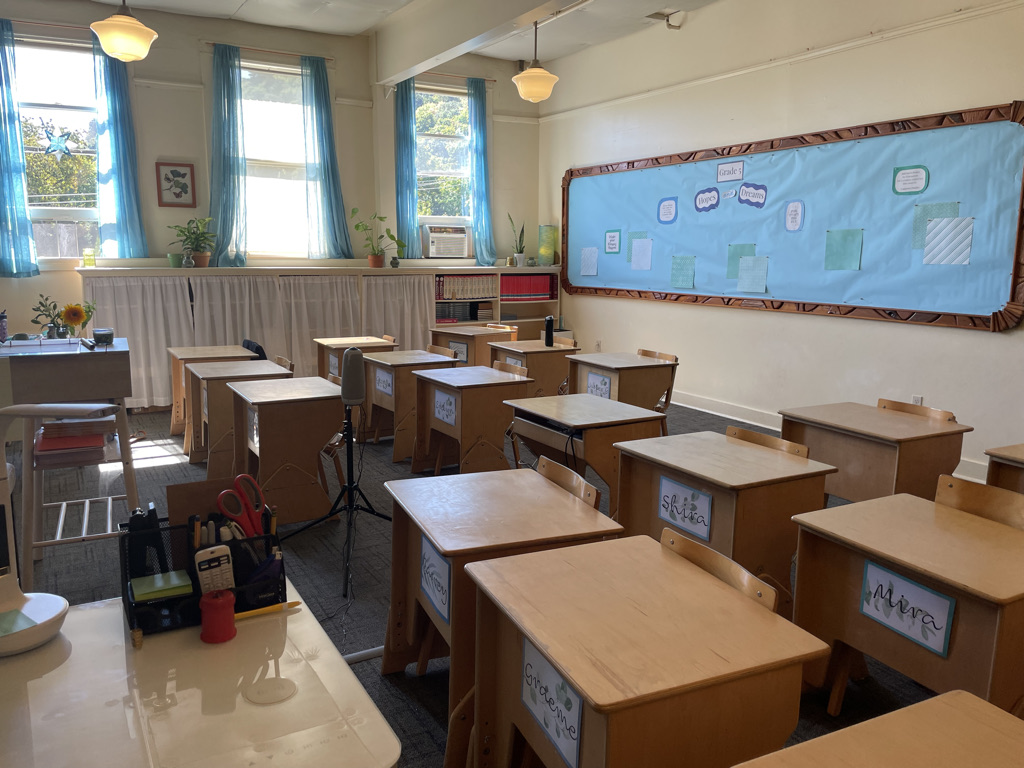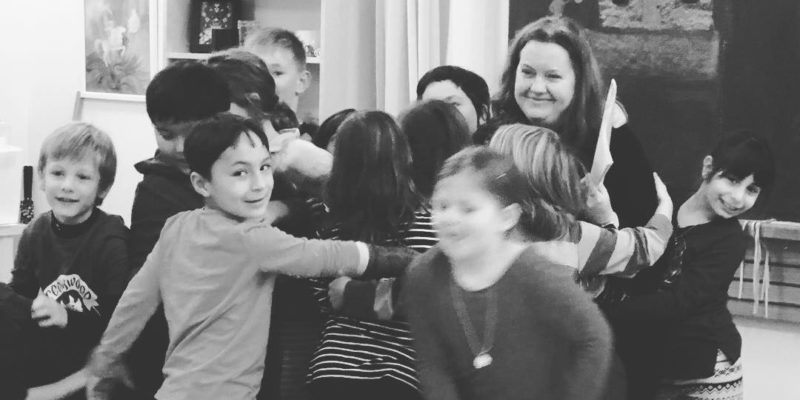When I first started teaching, classroom management was by far my greatest challenge. When I reflect on those days it is remarkably easy for me to get back in that frame of mind and remember the exact thought processes that made things so hard.
Amazing Waldorf Students
First off, I was in complete awe of my students. I had so much reverence and respect for the individuals they were. I looked at their confidence, the compassionate way they interacted with each other, their enthusiasm for the work, and I compared them to myself at their age. I’m afraid I woefully paled in comparison.
But that’s not the worst part. This comparison caused me to truly doubt myself. I put my students on such a high pedestal, that I started to question my own authority. Who was I to be their teacher? They were clearly on their way to being adults who had their act way more together than I did.
Oh gosh. I wish I could go back and tell new-teacher-Meredith just how worthy she was.

Respect Thyself
This phenomenon led to the second dynamic. Due to this situation and some personal stuff I was going through at the time, I was feeling so low, and questioned myself so much, that I just didn’t respect myself. And, of course, if you don’t respect yourself, no one else will either. When students were disrespectful to me (or each other) I just tolerated it. To be honest, I didn’t even recognize it as disrespect. I excused poor behavior with the understanding, “They don’t really mean it.”
Sign up for my free virtual Waldorf Classroom Management Workshop
Three Classroom Management Strategies Every Waldorf Teacher Should Know
Can I Really Control Anything Anyway?
The other big thing going through my mind at the time was the knowledge that when it really came down to it, I could not control my students. Ultimately, they could do anything! And I couldn’t do a darn thing about it. Honestly! I had visions of kids yelling at me, running out of the classroom, or completely blowing off whatever I told them to do. Of course, these things never happened, but I knew that if they ever did my powerlessness would be on full display.
But these things never happened because I developed a strategy for making sure they wouldn’t. My biggest fear was that my students would reveal my powerlessness by ignoring me or doing the exact opposite of what I told them. So my solution was to avoid telling them what to do as much as possible.
Are you kidding me? A teacher not tell her students what to do?! No wonder they didn’t respect me!
Is This What a Waldorf Classroom Should Look Like?
I realize now that at the foundation of all this fear and doubt was the basic question, “Is this what a Waldorf classroom should look like? Am I doing it right?”

I had SO many fixed ideas of what the perfect Waldorf classroom was supposed to be like and every day I walked away from my work feeling like my classroom was somehow wrong. There are so many of these “shoulds” in the Waldorf world and I think they are the biggest problem with this movement.
- Waldorf teachers should talk to their students with a calm, sing-song voice.
- Waldorf students are calm and quiet.
- Waldorf classrooms are tidy and organized at all times.
- Waldorf teachers are artistic and create beautiful chalkboard drawings.
- Waldorf lessons include the perfect blend of movement, artistic work, and academic challenge.
- Waldorf teachers tell all their stories from memory.
- Waldorf teachers craft all of their lessons from scratch, designed to meet the unique interests of their students.
Honestly, I could go on. I can’t tell you how many of the items above were either not true about my classroom OR had me working LONG hours depriving myself of sleep and other basic needs.
Thank Goodness Those Days Are Behind Me!
Okay, now that my little therapy session is over . . .
Do any of you struggle with these things? I sure hope not! It was all so painful!
But I hear from enough teachers to know that I’m not the only one who has struggled with the expectations of this work. And the thing is, the job is already hard, and we’re making it so much harder by setting up some unrealistic and imaginary perception of what it should be.
It’s taken me some long, hard years of acceptance and experience to come to this realization, but my classroom and I are pretty far from the Waldorf aesthetic ideal, and, you know what? It’s okay!
- I talk to my students like an authentic human being. That sing-song voice just isn’t me.
- My students are LOUD. And they aren’t CALM, either. Sometimes they’re an overwhelming tide of activity that I truly can’t control. Sometimes all I can do is accept those moments, shake my head, and just wait for them to pass.
- My classroom is a disaster a good bit of the time.
- I haven’t had a drawing on my chalkboard since October (okay, I do feel guilty about that one.)
- Sometimes I read my stories instead of telling them.
- I don’t create all of my lessons from scratch. I get plenty of ideas from other teachers.
I’ve come to realize that none of these things truly matter.
The thing that does matter is how my students feel when they are in my classroom. If those kids are happy, having fun, working hard, and feeling good about it THAT’S ALL THAT MATTERS.
And I guarantee that if I was stressing out about all of those “shoulds”, staying up late, feeling inferior, fretting that I wasn’t measuring up, my students would NOT be feeling so good. And heck, neither would I!
Get on the list to find out when my virtual Waldorf Classroom Management Workshop is live!
So, I encourage you to ask yourself what are the Waldorf shoulds you need to kick to the curb? I encourage you to question those standards you’re setting for yourself and truly ask if those values are contributing to the overall health of your classroom organism.
And maybe you need to forward this post to a colleague? Maybe your school is in need of a culture shift. I’ve definitely seen schools that hold high standards on a particular metric (like silent hallways or chalkboard drawings) that ends up feeling oppressive and unobtainable for teachers.
Let’s remember what’s important. And do what we can to make this job easier, especially at this time when it is so very hard.




Leave a Reply